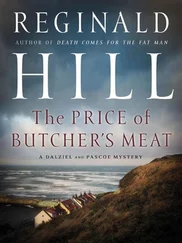1 ...8 9 10 12 13 14 ...27 She was still wondering if she could bring this situation to a conclusion without testing what level of voltage was necessary to subdue a mountain when Hadda smiled – that was the first time – and placed his empty hands palm up on the table and said, ‘I think if they were going to come they’d have been here by now, don’t you agree?’
It took a second or two to get it. He’d been testing her assurance that the watching officers could not hear what was being said. Her mind was already exploring the implications of this, and she did not realize that her body was shaking in reaction until the door slid open and Officer Lindale said, ‘You OK, miss?’
‘Yes, thank you,’ she said. ‘Just got something stuck in my throat.’ And subsumed her trembling into a bout of coughing.
He said, ‘Like some water, miss?’
She shook her head and said, ‘No thanks. I’ll be OK.’
When the door was closed again, Hadda said, ‘Sorry about my little charade. What you need is a stiff brandy. I suggest we cut this session short so you can go and get one.’
She was still struggling with the after-effects of the shock and now she had to adjust to the new tone of voice in which he was addressing her.
Somehow she managed to keep her own voice level as she replied, ‘No, if you’re so keen to be sure we’re not being listened to, I presume that means you’ve got something you’d like to say.’
‘Not now,’ he said. ‘What I’ve got is something for you to read. OK, I’m convinced you’re telling the truth when you say there’s nobody listening to us. Now I’d like your reassurance that nobody else will read this or anything else I give to you.’
As he spoke, he pulled from his prison blouse a blue school exercise book.
This was a shock different in nature from the threat of a shiv attack but in its way almost as extreme.
With many of her clients, she suggested that if they felt like putting any of their feelings or thoughts down on paper before their next meeting, this could only be to the good. Nobody but herself would see what they wrote, she assured them, an assurance some took advantage of to lay before her in graphic detail their sexual fantasies.
Hadda had simply blanked her out when she first suggested he might like to write something. She’d repeated the suggestion over several weeks, then at last she had given up.
So this came completely out of the blue. It should have felt like a breakthrough, but she didn’t have the energy to exult.
She realized Hadda was right. What she wanted to do now was get away to somewhere quiet and have a stiff drink.
She said, ‘I promise you. No one will read anything of yours, unless you give permission. All right?’
‘It will have to be,’ he said, handing her the book.
She took it and held it without attempting to open it.
‘And this is…?’ she said.
‘You keep saying you want to understand how I ended up in here. Well, this is the story. First instalment anyway.’
She stood up, glanced at one of the cameras, and said as the door opened, ‘I look forward to reading it.’
Then she’d headed straight back to her flat, had the longed-for stiff drink after which, rather to her surprise, she was violently sick.
When she was done, she had a very hot shower. Dried and wrapped in a heavy white bathrobe, she sat at her dressing table and stared back at herself out of the mirror.
Behind her, through the open door into the living room, she could see the exercise book lying on a table where she’d thrown it on entering the flat.
Opening it was going to be the first step on a journey that could take her to some very dark places. No darker, she guessed, than many others she’d visited already. But somehow going there in the company of Wilfred Hadda seemed particularly unappealing.
Why was that? she asked herself.
Not because of any horrors that might possibly be revealed. They came with the territory. So it must have something to do with the man they would be revealed about.
This was a measure of his power. This was why she must be on her guard at all times, not against the physical threat which he had used to test her assurance of confidentiality, but against a much more insinuating mental and emotional onslaught.
She recalled her father’s words when she told him about the job offer.
‘Elf,’ he had boomed, ‘you sure you’re not biting off more than you can chew?’
‘Trust me,’ she had replied. ‘I’m a psychiatrist.’
And they had shared one of those outbursts of helpless laughter that had her mother looking at them in affectionate bewilderment.
But now, alone, in her mind’s eye she conjured up an image of the menacing bulk of Parkleigh Prison printed against the eastern sky and shuddered at the thought of driving towards it in the morning.
Parkleigh Prison was built in the 1850s on a marshy greenfield site in Essex just outside London. As if determined that it would be to penology what cathedrals were to religion, its architect incorporated into the design a single massive tower, visible for miles around in that flat landscape, a reassurance to the virtuous and a warning to the sinful.
Rapidly overtaken by the capital’s urban sprawl, it continued pretty well unchanged until the 1980s when even the Thatcher hardliners had to accept it was no longer fit for purpose. Closed, it languished as a menacing monument to Victorian values for a decade or more. Everyone expected that eventually the building would be demolished and the site redeveloped for housing, but then it was announced, in the face of considerable but unavailing local protest, that under the Private Finance Initiative, Parkleigh was going to be refurbished as a maximum-security category A private prison.
It would be a prison for all seasons, enthused the developers. Outside dark and forbidding enough to please the floggers and hangers, inside well ahead of the game in its rehabilitatory structures and facilities.
Its clientele was to be category A prisoners, those whom society needed to be certain stayed locked up until they had served out their usually lengthy sentences. In 2010 Wolf Hadda was sent there to popular acclaim. Five years later he was joined by Alva Ozigbo, to far from popular acclaim.
There were two main strikes against her.
As a psychiatrist, she was too young.
And as a woman, she was a woman.
Outwardly Alva treated such objections with the contempt they deserved.
Inwardly she acknowledged that both had some merit.
At twenty-eight she was certainly a rising star, a rise commenced when she’d worked up her PhD thesis on the causes and treatment of deviant behaviour into a book with the catchy title of Curing Souls. This attracted attention, mainly complimentary, though the word precocious did occur rather frequently in the reviews. But it was a chance meeting that brought her to Parkleigh.
Giles Nevinson, a lawyer friend who hoped by persistence to become more, had invited her to a formal dinner in the Middle Temple. While she had no intention of ever becoming more, she liked Giles. Also, through his job with the Crown Prosecution Service, he was a useful source of free legal advice and information. So she accepted.
Giles spent much of the dinner deep in conversation about the breeding of Persian cats with the rather grand-looking woman on his left. As he explained later, it was ambition rather than ailurophilia that caused him to neglect his guest. The other woman was Isa Toplady, the appropriately named wife of a High Court judge rumoured to be much influenced by his spouse’s personal opinions.
Alva, obliged to turn to her right for conversational nourishment, found herself confronted by a slightly built man in his sixties, with wispy blond hair, pale blue eyes, and that expression of rather vapid benevolence with which some painters have attempted to indicate the indifference of saints to the scourges they are being scourged with, arrows they are being pierced with, or flames they are being roasted with.
Читать дальше












